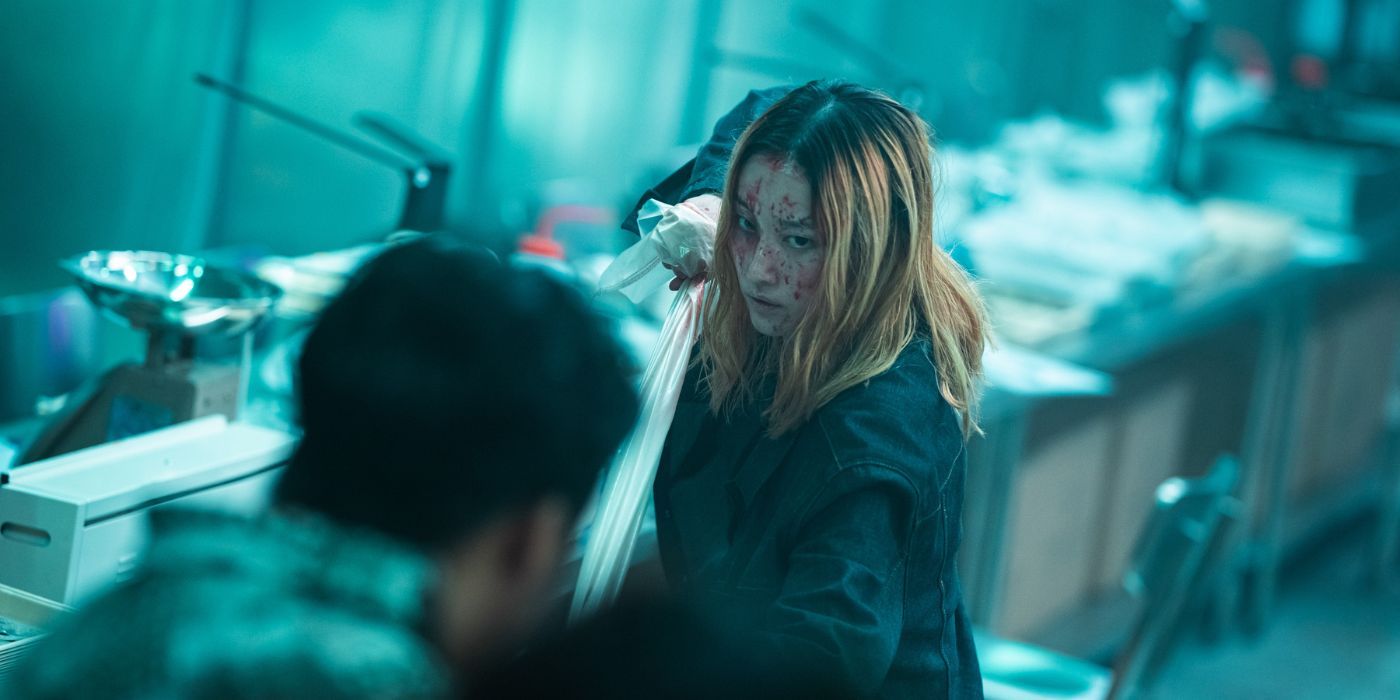Netflix's Ballerina hits all the crucial marks one craves from a revenge thriller. Protagonist Ok-ju (Jeon Jong-Seo), a retired bodyguard with fight training lifted from the John Wick handbook, has a very particular skill set. She aims to avenge a loved one's death. She grimly declares, "I need guns." The cinematography favors shadowy corners and neon-drenched streets, while the action sequences spray enough inventive gore to make David Cronenberg grimace. A woman leading an action thriller isn't even an outlandish concept anymore, despite what some internet comments might say. So how does Ballerina distinguish itself from its peers while still embracing its place in Korean revenge cinema? As it turns out, simply. Ballerina is an unrepentantly humane and woman-centric revenge epic that puts a sleek budget to full effect with impressive panache. Why wait for the actual John Wick spin-off that's also entitled Ballerina when writer-director Lee Chung-hyun's creation is currently streaming?
What Is the Netflix Korean Movie ‘Ballerina’ About?
When the audience first meets Jeon Jong-Seo's Ok-ju, she's a recalcitrant, withdrawn figure. Even after she effortlessly dispatches a group of robbers at a convenience store, she's a woman of few words. She eats alone in her apartment, the darkness lit only by a text notification from a contact nicknamed "Ballerina." This is Min-hee (Park Yu-rim), a professional ballerina, a former classmate, and Ok-ju's only human connection. Ballerina never reveals from what profession Ok-ju's retired, but if she was a bodyguard as she implies, it was high-profile work that demanded the same flair as a highly choreographed assassin. Ok-ju must deploy those skills when she discovers Min-hee has taken her life, leaving Ok-ju a message pleading for her to avenge the circumstances surrounding Min-hee's death. After a period of predatory investigating, Ok-ju sunders her way through a barrage of enemies with the bespoke empty-eyed stare of every vengeful antihero.
To ensure Ok-ju's sanctioned massacre matters, Ballerina builds Ok-ju and Min-hee's relationship through carefully placed — and paced — flashbacks. Truthfully, the character details are sparse and the ideas irrelevant to the point, that this friendship is powerful enough to extend beyond the grave. The former schoolmates accidentally reunite when the forlorn Ok-ju buys herself a birthday cake. Min-hee immediately decides to befriend her and is the outgoing, sincere sunshine to Ok-ju's gnarly, aimless shadows. It takes time and prodding for the latter woman to emerge from her shell, but she lets Min-hee dye her hair and goofs off with her in photo booths.
These snapshots are charming in their reliability. They tenderly craft Ballerina's pivotal friendship into something intimate and humane. The loss of Min-hee matters as much as the hole her death leaves in Ok-ju's life. Ok-ju explicitly says that after working in a constantly dangerous profession, it took Min-hee's influence for Ok-ju to realize how rewarding life could be. If Ok-ju protects her clients and innocent strangers, then Min-hee saw Ok-ju as someone in emotional need and protected her accordingly. By their nature, revenge thrillers often prioritize romantic relationships or familial ties as the be-all-end-all loss. Even more often, it's through a male lens. While Ok-ju and Min-hee's relationship can certainly be read as amorous queer longing, Ballerina textually champions the importance and relevancy of female friendships through its quiet, unquestioned naturalism.
‘Ballerina’ Is a Revenge Thriller Where Women Take the Lead
No matter how often movies offer up the image, it's undeniably satisfying to see a woman act gritty, accomplished, and furious on a level equivalent to any male hero. Ok-ju's ocean-deep eyes seethe with anguish. Her blood-stained face and unstoppable determination are a genre rite of passage. This is nothing new for Korean thrillers, especially ones positing revenge as a byproduct of systematic government failure. It's still a superb look for Ok-ju. This one-woman army doesn't negotiate. She headshots powerful men mid-speech. Even when her prey screams in panicked fury, accusing Ok-ju of overreacting, she's stone-faced in her resolve.
As aesthetically fun as this would be in most contexts, it's Ballerina's perspective that matters. Ok-ju is a friend seeking revenge first and a bodyguard-assassin second. Her abilities are auxiliary to her purpose. The movie's opening confrontation at the convenience store positions Ok-ju as a rescuer, a character trait Min-hee trusts to punish those who wronged her. And when Ok-ju refuses to report Min-hee's death to the police, the typical "I have to do this myself" stance reflects the depth of Ok-ju and Min-hee's friendship rather than just serving a plot purpose. Ok-ju's "suit up" sequence before a giant battle amounts to her lacing her sneakers and tucking an unreliable old revolver into her jeans. Better ammunition would be nice, but she's not distracted by the sleek outfits. Ok-ju is messy, and that simple, concentrated rage is all she needs.
Discussions of morality aside, within the story Ballerina's telling, the men responsible for Min-hee's death deserve every ounce of Ok-ju's furor. As she hunts down the sadistic sexual predator Choi Pro (Ji Hun-Kim), Ok-ju discovers Choi's involvement in a sex trafficking ring sanctioned by the authorities. Choi has drugged and sexually assaulted dozens of women, recording the acts and collecting the files like a trophy case. Min-hee is one of these tapes. Meanwhile, the trafficking ring constantly kidnaps, tortures, and sells underage girls and young women. Decades ago, tying women's revenge fiction to sexual assault was common enough to warrant a subgenre: the "rape-revenge" film. Personally, I'd like to see more of the theme (revenge) divorced from the subject matter (violation), but to Ballerina's credit, it's unflinching while never actively degrading women onscreen. Some scenes of implied torture linger longer than preferable, but in the balance between delicacy and brutality, Ballerina's more avoidant of cinematic voyeurism than most. Rather than witnessing Choi's assault of Min-hee, aftermath scenes of her collapsing during a ballet performance illustrate the severity of her trauma.
Centering Women Makes ‘Ballerina’ a Better Movie
Ballerina doesn’t interrogate the “violence begets violence” concept. An eye for an eye doesn't matter when men are living demons who, in Ok-ju's words, "thought we were easy prey." When Choi tries taunting Ok-ju one last time before his imminent death, she replies that she'll hunt him and his kind "all the way down to hell" for their crimes. Even a girl Ok-ju inadvertently rescues calmly intends to kill everyone involved. Ballerina's answer to a complicated moral quandary is yes, burn men alive with an enormous flamethrower. Take whatever catharsis that brings. Violent revenge doesn't leave a mark on Ok-ju's soul — the torture of these women does. The film's last frame is Choi's body burning on a beach, but the image is bracketed by Ok-ju's memories: she and Min-hee felt joy together on this same breach. The thesis couldn't be clearer.
The limited "fun" one can deride from Ballerina comes courtesy of the action. The sequences are frantic yet choreographed as intricately as a ballet. The kinetic camera utilizes punching zooms and slow motion, while the fluid editing keeps things quick without losing spatial awareness of Ballerina's unconventionally colorful sets. It's difficult not to see shades of action directors from the past. But not every movie can or should be boxed into just a reflection of its predecessors. Ballerina's aware of its influences and knows when to let a woman blaze a righteous path of violence, and when to inject a sly self-awareness. When Ok-ju says, "I need guns," the supplier has busted offerings and retro revolvers. The latter fails her in a pivotal moment, which is good for a chuckle. Shortly thereafter, the tone pivots: Ok-ju uses the Chekhov's gun flamethrower and ensures her ambiguous morality. Killing evil men might not bring her peace, but she fulfilled Min-hee's last request. Theirs was a friendship worth going to hell for. Maybe that ideation, grounded as it is by the female respective, is what the revenge thriller needs.
The Big Picture
- Netflix's Ballerina is a woman-centric revenge thriller that hits all the marks, with a protagonist on a mission to avenge a loved one's death.
- The film distinguishes itself by being unrepentantly humane, with a focus on the powerful friendship between Ok-ju and Min-hee.
- Ballerina centers on women taking the lead, showcasing a gritty and furious female hero who seeks revenge while championing the importance of female friendships.




